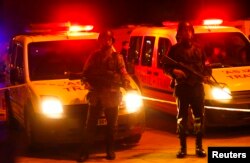Turkey has blamed the car-bombing that killed 28 people in Ankara on a Syrian man with links to Kurdish militia groups, but the United States said Thursday it has yet to determine who launched the attack.
Prime Minister Ahmet Davutoglu said Wednesday's attack in the Turkish capital was carried out by the PKK Kurdish separatist group, "together with a person who sneaked into Turkey from Syria."
He said the Syrian man was a member of the YPG, the armed faction of a Syrian Kurdish rebel group. Ankara considers both the YPG and the PKK to be terrorist organizations.
In Washington, deputy U.S. national security adviser Ben Rhodes condemned the attack, which damaged or destroyed five buses carrying military personnel in the center of Ankara, but said the U.S. has "not settled upon assignment of responsibility."
U.S. Secretary of State John Kerry called Turkish Foreign Minister Mevlut Cavusoglu to express Washington's "steadfast commitment" to its partnership with NATO ally Turkey "in the shared fight against terrorism."
Davutoglu has appealed for international denunciations of the YPG — apparently an indirect reference to U.S. support for the Syrian Kurdish fighters in their battle against Islamic State militants.
Rhodes said the U.S. "made clear to the Turks that in all of our engagements with the YPG and other Kurdish elements, that we make very clear to them the importance of our alliance with Turkey, and the importance of them not engaging in efforts that would undermine what should be our focus, which is the shared threat of ISIL."
ISIL is an acronym for Islamic State.
Saleh Muslim, the head of the YPG, denied Turkey's allegations and said his organization was not involved in or linked to the Ankara attack.
The car bomb was detonated Wednesday just a few hundred meters from Turkey's parliament and military headquarters. No one has yet claimed responsibility, but Davutoglu said nine people have been detained in connection with the attack.
The pro-government Yeni Safak newspaper said the attacker who detonated the bomb was registered as a refugee in Turkey, and was identified by his fingerprints.
Hours after the bombing, Turkey's air force launched fresh strikes on PKK targets in northern Iraq. The Turkish military said it was targeting 60 to 70 of the group's fighters.
'Turkey will not shy away'
President Recep Tayyip Erdoğan denounced the bombing as an act that exceeded "all moral and humane boundaries," and declared Wednesday that "Turkey will not shy away from using its right to self-defense at any time, any place or any occasion."
After the bombing, Erdoğan postponed a planned visit to Azerbaijan and Davutoglu canceled a trip to Brussels to discuss the European refugee crisis.
Islamic State was blamed for last October's suicide bombing at a peace rally in Ankara that killed more than 100 people — the bloodiest single terrorist attack since Turkey became a modern state in 1923.
Turkey has also been battling the outlawed Kurdistan Workers Party, which has been fighting a 30-year guerrilla war for more Kurdish autonomy in southeastern Turkey. The Turkish military has been a frequent target of the militants.
Dorian Jones contributed to this report from Istanbul














